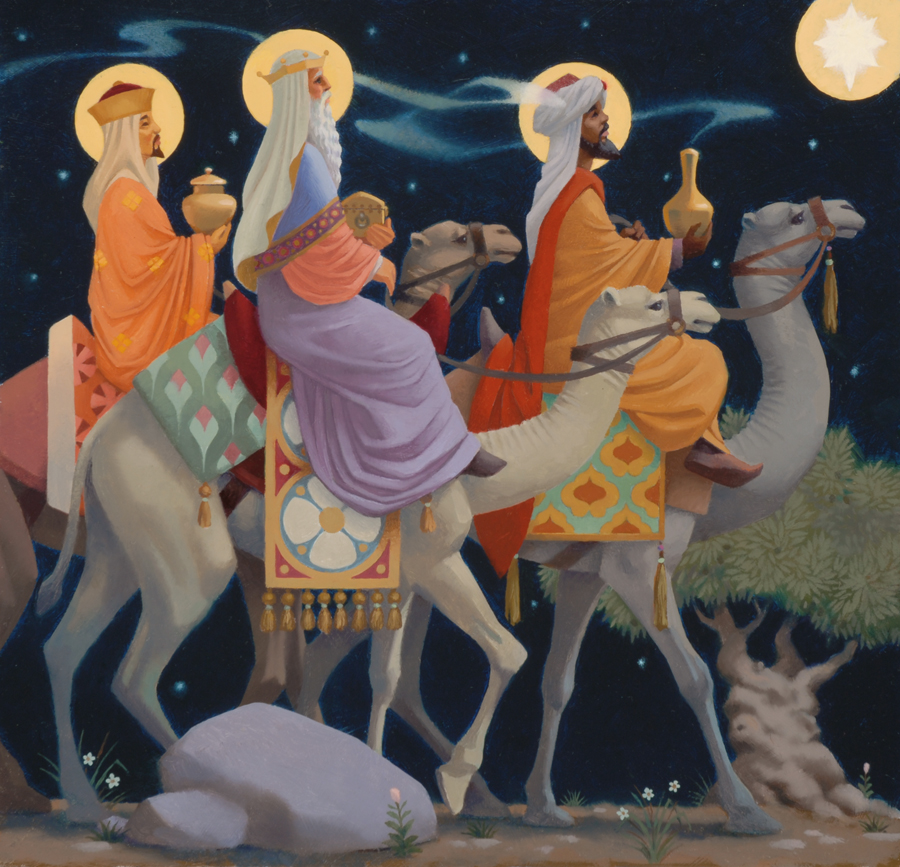
I think Christmas is perfectly placed on the calendar. Though for me, Christmas really is a season and not just a day. It’s Christmastime. Yet it’s a season that ends with a fabulous holiday, pregnant with meaning.
There’s a lot to love about Christmas. For one thing, I love the contrast with Easter. Christmas is a nighttime holiday, while Easter is a morning holiday. Christmas is observed just after the longest night of the year, celebrating the Light of the World entering the darkened condition of humanity. By contrast, Easter is observed just as the natural world is waking up to renewed life in spring, celebrating the dawning of spiritual rebirth and salvation for humanity.
It is this bringing of rebirth and life to humanity that was always the point of Christ’s coming, but at His birth, the point is still necessarily hidden and wrapped up in mystery. No one had an inkling of the changes that the infant Messiah would someday bring; of the unexpected way He would fulfill both the veiled foreshadowings and the explicit prophesies in the Torah and the prophets. The hard work of reconciling humankind to God was still before Him; the nature of His mission and kingdom still hidden; the full inclusion of all nations not yet understood. Human understanding was still darkened.
The Light had finally come! What would He reveal?
There is much about lighting up the darkness at Christmas: Candles lit. Fires burning. Lights strung. Stars appearing. There is beauty and meaning in lighting up the darkness at Christmastime. These lights symbolize the Light of the World and the light of His Love – the light of the Truth and the light of His Life. The apostle John writes that “God is light, and in Him there is no darkness.” In his gospel he writes of Jesus, saying, “in Him was life, and the life was the light of men. The light shines in the darkness, and the darkness did not comprehend, or overcome, it” (NASB).
Light draws people in from out of the darkness. His light brings us together. John elaborates, “…if we walk in the light as He Himself is in the light, we have fellowship with one another, and the blood of Jesus His Son cleanses us from all sin.” The light of His forgiveness burns away our need to stay isolated in darkness.
Much of the meaning of Christmas is about anticipation. We remember the anticipation of Israel longing to hear from her God again after 400 years of silence from her prophets. We remember the anticipation of that nation awaiting her promised Messiah, and the anticipation, though misguided, around what that Savior would do. We remember the anticipation of a young Jewish woman about to deliver her miraculously conceived firstborn. And then the scriptures speak of the anticipation that God Himself felt in restoring humanity to relational unity with Himself.
The humble arrival of Jesus in human flesh is a gift of love from our heavenly Father, leading to His gift of salvation. James, the brother of Jesus, wrote, “Every good gift and every perfect gift is from above, coming down from the Father of lights, with whom there is no variation or shadow due to change.” How appropriate, then, that gift giving is a part of celebrating Christmas.
This brings us to the date in question. Why December 25th? Every Christmas season, trolls come out to mock Christians for naively celebrating a “pagan holiday.” We “ignorantly” participate in supposedly pagan rituals, like decorating trees. “Skeptics” assert that the winter solstice was celebrated by pagans long before the birth of Jesus. Christmas is supposedly derived from the Roman holiday, Saturnalia, in honor of the agricultural god Saturn.
But this is like mocking a family for buying, renovating, and living in what was formerly a crack house. Who cares what once went on in the house when something better has replaced it? The fact is that for most Christians today, December 25th is the celebration of the birth of Jesus. Practically speaking, it matters to no one what pagans may or may not have celebrated a few thousand years ago, or that a pope co-opted a popular winter festival to help get pagans on board with Christianity.
Most Christians are well aware that Jesus was not born on Dec 25th and that no one knows the actual date of His birth. So if one must pick a date on which to celebrate the deeply profound first advent of Jesus, what better date than Dec 25th, for all the reasons mentioned above? Here again there is a contrast with Easter. The resurrection of Jesus is explicitly tied to the spring feasts of Israel, particularly Passover. But the birth of Jesus has no such clear biblical link, so if one wants to celebrate His birth, why not infuse life and hope into the dead of winter?
Furthermore, if anyone cares to look, there is good evidence specifically connecting December 25th to the first advent of Jesus. There is evidence in the field of modern astronomy that the magi made their famous visit to the child Jesus in Bethlehem on December 25th. Of course, according to the scriptures, Jesus would have been a toddler by then, and living in a house rather than lying in a manger. Nonetheless, it’s an extraordinary coincidence that the magi likely brought gifts to Jesus on December 25th, the same day we mark our modern celebration with gift giving.
It’s also significant that the magi were not Jewish. They are the first foreshadowing in the life of Jesus that the Jewish Messiah had come not only for Israel, but also for all nations. In fact, the magi may well have fit the definition of “pagan.” So much, then, for the argument that the church stole December 25th from paganism. One could just as likely argue that the winter solstice was waiting for Jesus to give it a deeper and better meaning than the pagan celebrations gave,. After all, if the scriptures are true, then He is the Creator of the winter solstice.
Based on my many conversations with “skeptics,” I suspect that claims of the pagan roots of Christmas are part of the larger effort to de-legitimize Jesus and His Church. The idea is to show that there is nothing unique about Jesus; that Christianity is just one more version of the many man-made religions and invented gods that came before it. The claim is that early paganism contains scores of virgin birth myths, resurrection stories, and other similarities to the Bible.
But careful scholarship has shown those claims to be untrue. There is no one else like Jesus, and nothing else like the story of His virgin birth, or the story of His bodily resurrection – at least, nothing that pre-dates the gospel accounts. (Supposed pagan parallels include stories like the god Mithra, who was born from out of a rock; not quite the virgin birth depicted in the bible.)
As for Christmas, the celebration date may have been arbitrarily chosen, but that doesn’t make its roots pagan. The story of Jesus is explicitly rooted in the ancient Jewish scriptures, but its branches have spread around the world. I am always excited to join the worldwide celebration.
The Light has come!

You can read about the astronomy surrounding Jesus’s birth and Dec 25th, HERE and HERE.
To read my debate with a qualified Star-of-Bethlehem debunker, read the comment section HERE.
About the painting: This piece was a commission for Conception Abbey, a Benedictine monastery in northwest Missouri. The painting was designed to match the Beuronese style of a series of large murals encircling the interior of the basilica, (completed in the1890s.) I was commissioned to paint additional Christmas imagery in this style. I depicted the magi representing the gentile nations. The olive tree in the background is a reference to Romans ch 11 – Paul’s discourse on the “wild” gentile nations being grafted into the “cultivated” Jewish olive tree. I don’t particularly enjoy painting in this meticulous manner, but it was a fun project!
